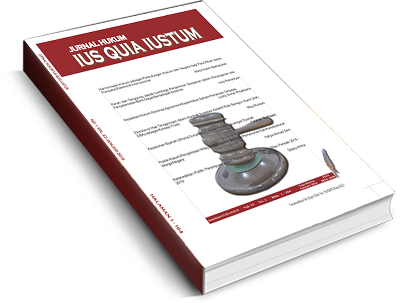Main Article Content
Abstract
This research is empirical legal research. The data used is primary and secondary data which are analyzed using editing analysis style technique later.
This is caused by many factors which are: the government’s lack of preparation in protecting domestic flight industry by not providing clear regulation in determining tariff, the operator’s lack of preparation in conducting flight service, the lack of facility in pursuing open sky. There is economical, social, defense and security implication from the application of open sky policy for Indonesia. However, the most significant implication from these impacts is economy defense, and security implication.
Keywords
Article Details
Authors who publish with this journal agree to the following terms:
a. Authors retain copyright and grant the journal right of first publication with the work simultaneously licensed under a Creative Commons Attribution License that allows others to share the work with an acknowledgement of the work's authorship and initial publication in this journal.
b. Authors are able to enter into separate, additional contractual arrangements for the non-exclusive distribution of the journal's published version of the work (e.g., post it to an institutional repository or publish it in a book), with an acknowledgement of its initial publication in this journal.
References
- Daftar Pustaka
- B. Tatelman, Todd, Legal Developments in International Civil Aviation, Congressional Research Service, The Library of Congress, 2006.
- Claessens, Stijn, and Marion Jansen, 2000, Internationalization of Financial Services, Issues and Lessons for Developing Countries. Kluwer Law International, New York.
- Council of ICAO, “Developments in International Air Transport Regulation and Liberalization†supplement to A37-WP/5 EC/1, diambil dari http://www.icao.int/icao/en/atb/epm/index.html tanggal 23 Maret 2011.
- D., Hummels, “Transportation Costs and International Trade in The Second Era of Globalizationâ€, The Journal of Economic Perspectives 21, 3, 2007.
- F. Crabtree, Benyamin, Doing Qualitative Research. Sage Publication, London, 1995.
- Hindley, Trade Liberalization in Aviation Services: Can the Doha Round Free Flights? AEI Press, 2004.
- J. E. and V. Trindade, Rauch, “Ethnic Chinese Networks in International Tradeâ€, Review of Economics and Statistics, 84, 2000.
- Kono, Masamichi, Opening Market in Financial Services and the Role of the GATS, Special Studies, WTO Secretariat, Geneva, 1998.L. Schless, Adam, “Opened Skies: Loosening the Protectionist Grips on International Civil Aviation†dalam Emory International Law Review Vol. 8, 1994.
- Likada, Frans, Masalah Lintas di Ruang Udara, Binacipta, Bandung, 1987.
- OECD, OECD Workshop on Principles for the Liberalization of Air Cargo Transportation: Principles for the Liberalization of Air Cargo, 2000, diambil dari http://www.oecd.org/dataoecd/7/9/1806687.pdf
- P., Hanlon, Global Airlines: Competition in a Transnational Industry, Third Edition, Elsevier, 2006.
- W. and P. Sauve, Hubner, “Liberalizing Scenarios for International Air Transportâ€, Journal of World Trade, 35(5), 2001.
- World Trade Organization, Second Review of the Air Transport Annex: Developments in the Air Transport Sector (Part Three), Note by the Secretariat, document S/C/W/270/Add.2, 2007.
References
Daftar Pustaka
B. Tatelman, Todd, Legal Developments in International Civil Aviation, Congressional Research Service, The Library of Congress, 2006.
Claessens, Stijn, and Marion Jansen, 2000, Internationalization of Financial Services, Issues and Lessons for Developing Countries. Kluwer Law International, New York.
Council of ICAO, “Developments in International Air Transport Regulation and Liberalization†supplement to A37-WP/5 EC/1, diambil dari http://www.icao.int/icao/en/atb/epm/index.html tanggal 23 Maret 2011.
D., Hummels, “Transportation Costs and International Trade in The Second Era of Globalizationâ€, The Journal of Economic Perspectives 21, 3, 2007.
F. Crabtree, Benyamin, Doing Qualitative Research. Sage Publication, London, 1995.
Hindley, Trade Liberalization in Aviation Services: Can the Doha Round Free Flights? AEI Press, 2004.
J. E. and V. Trindade, Rauch, “Ethnic Chinese Networks in International Tradeâ€, Review of Economics and Statistics, 84, 2000.
Kono, Masamichi, Opening Market in Financial Services and the Role of the GATS, Special Studies, WTO Secretariat, Geneva, 1998.L. Schless, Adam, “Opened Skies: Loosening the Protectionist Grips on International Civil Aviation†dalam Emory International Law Review Vol. 8, 1994.
Likada, Frans, Masalah Lintas di Ruang Udara, Binacipta, Bandung, 1987.
OECD, OECD Workshop on Principles for the Liberalization of Air Cargo Transportation: Principles for the Liberalization of Air Cargo, 2000, diambil dari http://www.oecd.org/dataoecd/7/9/1806687.pdf
P., Hanlon, Global Airlines: Competition in a Transnational Industry, Third Edition, Elsevier, 2006.
W. and P. Sauve, Hubner, “Liberalizing Scenarios for International Air Transportâ€, Journal of World Trade, 35(5), 2001.
World Trade Organization, Second Review of the Air Transport Annex: Developments in the Air Transport Sector (Part Three), Note by the Secretariat, document S/C/W/270/Add.2, 2007.
